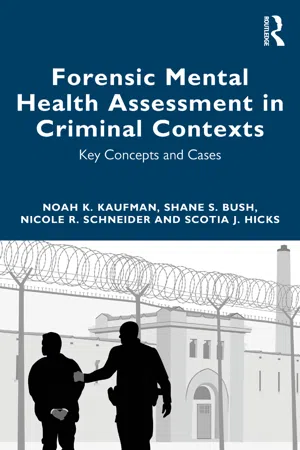
Forensic Mental Health Assessment in Criminal Contexts
Key Concepts and Cases
- 370 pages
- English
- ePUB (mobile friendly)
- Available on iOS & Android
Forensic Mental Health Assessment in Criminal Contexts
Key Concepts and Cases
About this book
This valuable compendium advances the understanding of mental health case law, making it highly accessible to practicing forensic professionals. Divided into two parts, the first section focuses on explaining important topics related to forensic psychological and forensic neuropsychological assessment, while the second section stands on its own as a collection of fascinating legal cases with high relevance to mental health and legal professionals interested in how mental health disorders impact criminal behavior among juveniles and adults.
The book begins with an accessible primer on abnormal behavior, exploring the links between criminal behavior and mental health disorders. It goes on to thoroughly describe what goes into forensic psychological and forensic neuropsychological evaluations, including discussion about the Federal Rules of Evidence, as they pertain to evidence-generation during the mental health evaluation process. The book also focuses on psychometric concepts, including reliability, validity, sensitivity, and specificity, as well as an exploration of 'science' and 'the law' which includes a discussion about the difference between science and pseudoscience, the different sources of law (constitutions, statutes, and case law), and how the intellectually competitive practice of law is similar to the enterprise of science. Ethical issues faced by the forensic mental health worker are also addressed. The second section of the book, Legal Cases for the Forensic Mental Health Professional, is an alphabetical summary of important and interesting legal cases with relevance for mental health professionals. These cases offer real-world significance while summarizing complex legal decisions through a neuropsychological sieve, to allow both legal and psychological communities to better understand each other's professions.
This book will be an invaluable resource for forensic psychologists, forensic neuropsychologists, forensic psychiatrists, and other mental health professionals whose work brings them into contact with the juvenile justice and adult criminal justice system. It will also be of interest to legal professionals, criminal justice departments, and law schools.
Frequently asked questions
- Essential is ideal for learners and professionals who enjoy exploring a wide range of subjects. Access the Essential Library with 800,000+ trusted titles and best-sellers across business, personal growth, and the humanities. Includes unlimited reading time and Standard Read Aloud voice.
- Complete: Perfect for advanced learners and researchers needing full, unrestricted access. Unlock 1.4M+ books across hundreds of subjects, including academic and specialized titles. The Complete Plan also includes advanced features like Premium Read Aloud and Research Assistant.
Please note we cannot support devices running on iOS 13 and Android 7 or earlier. Learn more about using the app.
Information
Section II Legal Cases for the Forensic Mental Health Professional
Case Summaries
Ake v. Oklahoma 470 U.S. 68 (1985) U.S. Supreme Court
Case Facts
Main Issue
Court Holding
Court's Reasoning
Quick Summary
Atkins v. Virginia 536 U.S. 304 (2002) U.S. Supreme Court
Case Facts
Main Issue
Court Holding
Court's Reasoning
Quick Summary
Mary Berghuis v. Van Chester Thompkins 130 S.Ct. 2250 (2010) 560 U.S. 370 No. 08-1470. Supreme Court of United States
Case Facts
Main Issue
Court Holding
Court's Reasoning
Quick Summary
Boykin v. Alabama 395 U.S. 238 (1969) U.S. Supreme Court
Case Facts
Main Issue
Court Holding
Court's Reasoning
What is at stake for an accused facing death or imprisonment demands the utmost so...
Table of contents
- Cover
- Half Title
- Title Page
- Copyright Page
- Dedication
- Contents
- SECTION I: Foundational Topics in Forensic Psychological and Forensic Neuropsychological Assessment
- SECTION II: Legal Cases for the Forensic Mental Health Professional
- Index